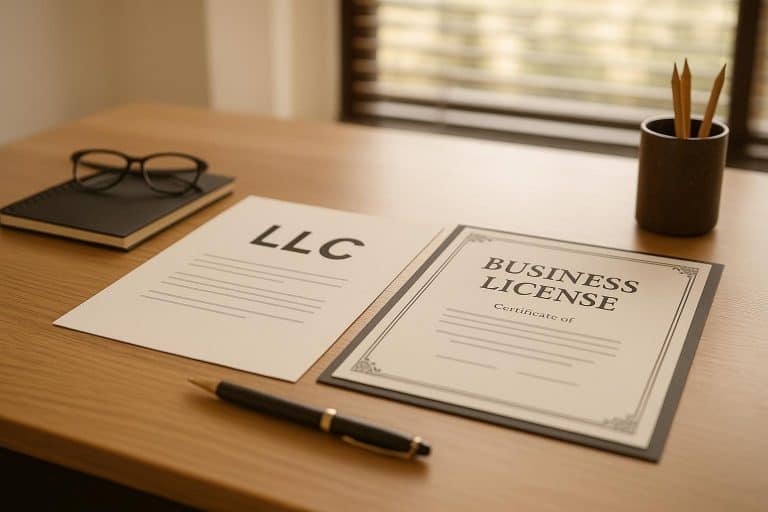Do you know how to pay yourself in an LLC without violating Internal Revenue Service regulations? Establishing a limited liability company is an excellent way to organize your business and keep yourself safe from liabilities.
There are various ways to earn an income from your business, such as receiving payments as a wage earner or getting distributions from generated profits. You can also hire and pay yourself as an independent contractor.
Are you a business owner seeking ways to pay yourself in an LLC? This article will define limited liability companies and illustrate the strategies to achieve success. Let’s get started.
What is a Limited Liability Company (LLC)?
A limited liability company is a private organization famous in the United States for protecting entrepreneurs’ assets. It shields company formation owners from the liabilities and debts of the business.
These companies are hybrid entities with the characteristics of sole proprietorship or partnership corporations. It’s a company where shareholders or members share the profits and losses monthly or annually while remitting tax returns.
Anyone can become a limited liability company, including corporations, individuals, foreign entities, insurance companies, banks, and other LLCs.
Pay yourself in an LLC: What are the best ways?
Receiving payments as a wage earner, getting distributions from generated profits, and working as an independent contractor are ways to pay yourself in an LLC. Let’s dig into the details:
1. Paying yourself as a wage earner
One of the best ways to pay yourself in an LLC is to receive payments as a wage earner. As an employee of the limited liability company, you’ll get compensation planned by the organization throughout the year. It’s an excellent idea for online company formation owners seeking a regular income apart from running a business.
Remember that to pay yourself a salary from a single or multiple-member LLC, and you must have an actual role with responsibilities and work actively for the organization.
If a company has multiple owners, all board members must equally participate in the business operations, and you cannot pay one without the other. But if only one entrepreneur runs the entity, you can receive wages for performing the management role without worrying about other LLC employees.
Operating expenses for the limited liability company, such as employee wages, can be deducted from the organization’s profits. It’s deductible only by the Internal Revenue Service (IRS), so ensure salaries you pay are within industry norms. Another excellent idea is issuing bonuses to workers of the LLC, including yourself.
When remitting payment to yourself as an employee of the company formation online, filing the Internal Revenue Service Form W-4 is crucial. It’ll determine the payroll amount withholding from every check you receive. You’ll get payment from the organization as a W-2 employee and will withhold employment and income taxes from the wages.
2. Receive distributions from LLC profits.
Another excellent way to pay yourself in an LLC is by receiving profit distributions from the limited liability company yearly. Every member or shareholder owns a share of the organization, known as the capital account. These payments are usually based on percentage, so if the business made $50,000 in profits, you may get 50%, and the other members are in partnership ownership.
You could also receive ongoing payments instead of profits at the year’s end. If the annual profit payment is within the $12,000 range, you could draw out a plan to get $1,000 monthly. The company will deduct the total amount throughout the year from the annual profit. So if your money exceeds the provided range, you will get the remaining amount after closing the books.
Suppose you run a single-member LLC with a free business address. In that case, the IRS will deduct the income tax from your distributions after filing the Schedule C form to report your losses and losses, including your tax return. If there are multiple shareholders, the Internal Revenue Service treats the organization as a partnership, meaning every member reports their profit share and pays income tax.
Furthermore, it’s crucial to know that getting wages or receiving year-end distributions from LLC profits are not usually mutually exclusive. Lastly, getting payment doesn’t affect your role as a shareholder or member of the company.
3. Work as an independent contractor
Paying yourself in an LLC can also come from hiring yourself to work as an independent contractor for the company. For example, if you possess multiple skills to improve the brand image or return on investment, consider hiring yourself as an independent contractor. Such arrangements might not yield numerous benefits, but it’s a chance to earn a passive income in the company.
Register your business online, but remember that filing the IRS Form W-9 is essential when paying yourself as a contractor for the organization. The company should also file Form 1099-MISC with the commission at the end of the year.
Keep in mind that you’ll pay self-employment taxes to prevent any business weakness.
Key Takeaways
After learning how to pay yourself in an LLC, consider learning the associated taxes to avoid unnecessary issues with the authorities. Another ideal option is consulting an experienced attorney or a certified public accountant to ensure things are in order.
However, you can decide not to pay yourself a dime and return profits to the business whether you run a single or multiple-member partnership. Furthermore, you also need to remit income tax from the profit earned to the Internal Revenue Service.








